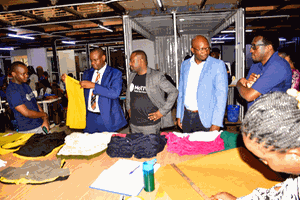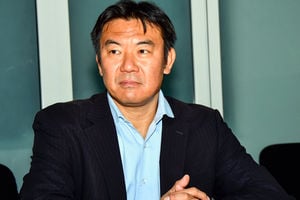
Peter Kisadha, a venture capitalist and the founder of Digest Africa. Investing in a tech company is about owning a small stake in something that has significant potential. PHOTO | COURTESY
An investment culture is booming in Uganda, but many eager investors are growing weary of focusing solely on local opportunities. Why? While the largest companies in Uganda are manufacturers and telecoms, in the developed world, it is the tech giants that dominate.
The difference is that most of Uganda’s largest firms (top 10) have been around for decades. But for some reason, they rarely absorb Gen Z tech-savvy talent that is more focused on solving problems through software development and global trends.
Incubation firms have helped. But they haven’t propelled start-ups to billion-dollar valuations like Go1 and Chipper Cash. Both of these companies share a common thread: they are owned by Ugandans who sought better environments, like South Africa and the US, to find their own ‘Silicon Valley.’
Peter Kisadha, a tech industry insider with a firm that tracks company deals, has recognised this issue. He is now collaborating with investors, career professionals, and entrepreneurs to build a funding ecosystem aimed at solving it.
He is building a community called ‘Nambi,’ designed to unite ambitious Ugandans, providing them with the resources they need to make a global impact in whatever they do.
“Any of these people can cross over to any of these groups. But the whole idea is that you have an aspiration to build a large business. Our definition of that is a billion-dollar business. For the career professional, do you aspire to work for the largest billion-dollar businesses in the world?” he asked.
“For the investors, do you have the courage and the willingness to invest in and support founders who have the vision to build billion-dollar businesses?” he adds.
Tech unicorns
In this pursuit, Mr Kisadha has already attracted members like Melvyn Lubega, a Ugandan based in South Africa who co-founded Go1. This tech company, the first South African unicorn, is valued at more than $2 billion according to the World Economic Forum.
It has attracted over $450 million in investment from Salesforce Ventures and M12 (Microsoft Ventures) among other tier-one international investors. Built through his passion for developing people, every 1.2 seconds someone somewhere in the world starts a course on Go1.
Mr Lubega has joined the community that Mr Kisadha and his colleagues are building, partly due to his role as a partner at a venture capital firm in Paris. Additionally, Nambi has also onboarded an executive director from Goldman Sachs.
“We have someone at Apple Inc.; we have on boarded others from JP Morgans, Morgan Stanley, and people like Stone Atwiine of Eversend, David Musinguzi of Rocket Health. We also have Anthony Natif of Guardian Health; Robert Kabushenga; Aeko Ongodia of Xeno Technologies; and Japeth of the Innovation Village. The idea is: How can we become captains of our industry?” Mr Kisadha depicts.
At one point, he hinted that brilliant, enthusiastic Ugandans should attend top global schools such as Harvard and Cornell and many more of that sort, to enhance their chances of working with leading companies, which can influence their career trajectories.
He relates this to a common tech sector saying: "Most founders in Africa are over-accelerated but underfunded."
This aligns with the feedback I received from several entrepreneurs at various incubation firms last month about why many of their startups struggle to thrive and scale to success. Some of them include Martin Musiime, the founder and chief executive officer of YoWaste, a waste management technology startup and Allan Ninsiima, the founder of Rada Shoes Uganda, a leather shoe manufacturer in Bweyogerere.
‘If we invest our money, we align our interests with theirs to pursue shared goals,’ Mr Kisadha explained. This approach mirrors how Uganda Development Corporation, the government’s investment arm, devoted in private firms like Speke Resort Munyonyo Hotel and Atiak Sugar Factory, among others.
However, it has long struggled with returns, shareholding certificates, and numerous break-even points in these partnerships.
Investment nuances
Mr Kisadha notes that it has taken him years to understand various investment nuances, as some executives often resist giving up majority shares in mergers and acquisitions to avoid losing control of their firms.
“What is the purpose of that?” Mr Kisadha asks. “It is one thing to argue that retaining majority shares gives you decision-making power. Sometimes, you can achieve that by controlling the Board or securing veto rights as a Board member,” he says.
Investing in a tech company isn’t about having majority control but rather owning a small stake in something with significant potential.the
This mirrors what Aeko Ongodia shared earlier this year: large businesses are generally more stable and have proven business models, making them less risky compared to small businesses still in early development stages.
In addition, large businesses benefit from economies of scale, which can lead to higher profit margins and competitive advantages over smaller businesses.
This is the same card that Bill Gates, the founder of Microsoft plays. He started the firm with a nearly 50 percent shareholding just before it went public in 1986. It was valued at approximately $520 million on its initial public offering.
But over the past 36 years, Mr Gates has slowly disposed of the majority of his shares to 1.3 percent in 2024, according to the most recent Securities and Exchange Commission disclosures.
He has been onboarding partners onto the company and diversifying his investments over time as the company grows. Today, Microsoft is the second most valued company in the world valued at $2.7 trillion just $200 billion below Apple. That is the same strategy that Apple used.
The founders of Apple are not its largest shareholders; that distinction belongs to asset managers like Vanguard Group Inc., BlackRock Inc., and Berkshire Hathaway Inc.
Mr Kisadha hopes to do the same with ‘Nambi’ by directing capital in ways that maximise returns for the start-ups created by its members.
He says eligible founders must have raised at least $100,000 (Shs372 million) in investment or achieved $50,000 (Shs186.5 million) in annual revenue. Career professionals should be employed in managerial roles at large businesses, and investors should either be working with an investment fund.
Nambi’s goal is to have $1 billion of funds under management.
“Doing a billion-dollar business is not easy anywhere in the world but two Ugandans have done it—that is Melyvin Lubega of Go1 and Ham Serunjogi of Chipper Cash plus Shamira Sendagala, who is an executive director at Goldman Sachs,” he says.
While Ugandans have had similar dreams before, pooling funds into unit trusts that invest for them daily, these firms have struggled to attract participants. There are about 70,000 investors in these firms that inch six.
They have managed to accumulate $712.4 million in assets under management by the end of 2023—a figure that falls short of what ‘Nambi’ aims to achieve.
Last week, Nambi raised $40 million (Shs149 million) for this pursuit.
“It was impossible. But when did that ever stop any dreamer from dreaming,” Laini Taylor, an American author, wrote in her book: ‘Strange the Dreamer’ which was published in 2017.
The story follows Lazlo Strange, a war orphan and librarian who undergoes an expedition to the mystic lost city of Weep, only discovering that it is more than what he believed it to be.







